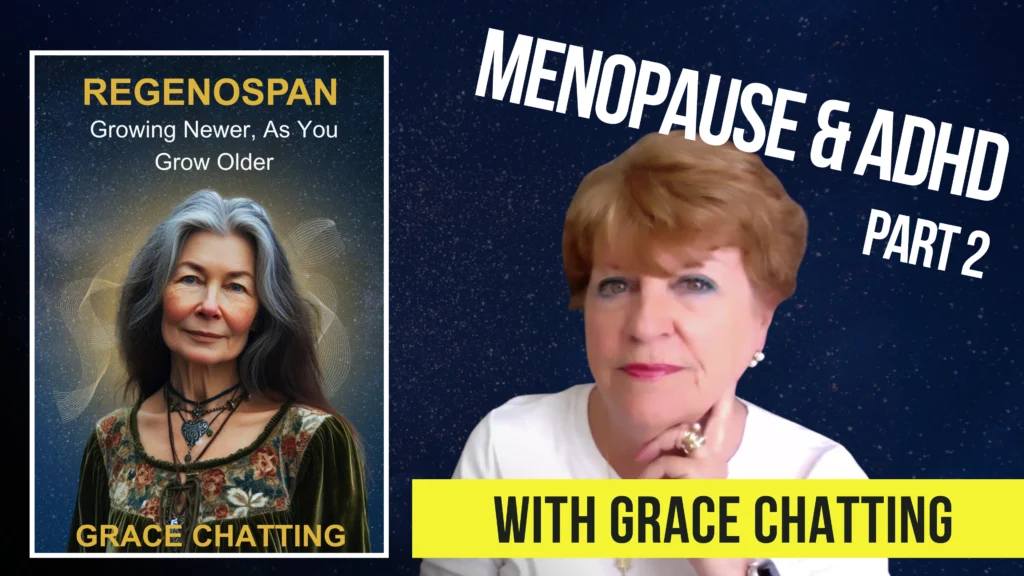Menopause and ADHD: What Every Neurodivergent Woman Deserves to Know – Part 2
As the dust of midlife begins to settle, you may find yourself in unfamiliar terrain — navigating a whirlwind of hormonal shifts, cognitive changes, emotional intensity, and deep personal reflection. If you’re a neurodivergent woman, especially one with ADHD, this transition can feel less like a phase and more like a full-system reboot.
But here’s the truth: this is not the end of something — it’s the beginning of something far more powerful. Let’s talk about how to care for your brain, body, and spirit during this time, and how to turn what may feel like chaos into clarity.
Practical Strategies to Support the Neurodivergent Menopausal Brain
1. Hormone Replacement Therapy (HRT) – If It’s Right for You
HRT can be a game-changer for many women navigating perimenopause and menopause. Rebalancing oestrogen levels doesn’t just ease hot flushes or night sweats — it can also improve cognitive function, emotional stability, and energy levels.
If you’re also managing ADHD, restoring hormonal balance may help reduce brain fog, stabilise mood, and lessen the intensity of executive dysfunction. It’s important to speak to a GP or menopause specialist to assess whether HRT is suitable for you, particularly if you have other medical conditions or a family history of certain illnesses.
2. ADHD Medications
For many neurodivergent women, midlife is the first time they’re formally diagnosed with ADHD — and with that diagnosis comes a whole new toolkit. ADHD medication, such as stimulants or non-stimulants, can improve focus, reduce overwhelm, and support better day-to-day functioning.
When combined with HRT, some women find this dual approach remarkably effective. However, it’s vital to work with professionals who understand the interaction between hormones and neurodivergence, as medication needs may shift with your cycle or hormonal treatment.
3. Create ADHD-Friendly Routines
Forget rigid schedules — what works for neurotypical brains may not serve you. Instead, build flexible, supportive routines that accommodate your natural energy cycles. Consider:
-
Using visual cues or timers for tasks
-
Breaking tasks into micro-steps
-
Allowing space for spontaneity and rest
-
Using apps or paper planners to externalise executive function
The goal isn’t perfection — it’s sustainability. Small, repeatable systems that reduce stress and increase autonomy can have a profound impact.
4. Support Your Nervous System
Your nervous system is at the heart of how you process the world — and it may be more sensitive during this time. Chronic stress, overstimulation, and internalised pressure can lead to burnout or shutdown.
To support your nervous system:
-
Prioritise rest and recovery
-
Experiment with breathwork, meditation, or grounding exercises
-
Reduce sensory overload where possible
-
Explore body-based therapies like somatics or craniosacral therapy
Nervous system regulation isn’t a luxury — it’s foundational for mental clarity, emotional balance, and resilience.
5. Find Your Own Rhythm
This is the time to stop fighting your natural pace and start honouring it. Menopause often brings a slower, more intuitive rhythm — one that doesn’t align with hustle culture or outdated ideas of productivity.
Ask yourself:
-
When do I feel most energised?
-
What drains me?
-
What would it feel like to move through my day in tune with myself?
By letting go of other people’s expectations, you begin to reclaim your own internal compass.
6. Seek Therapy or Coaching with a Neurodivergent-Aware Professional
Working with a therapist or coach who understands both neurodivergence and midlife transitions can be transformative. They can help you unlearn unhelpful narratives, develop tailored coping strategies, and explore deeper questions around identity, legacy, and healing.
Look for professionals who are trauma-informed, ADHD-literate, and menopause-aware — ideally someone who sees the whole you.
Reclaim Your Power and Rewrite the Narrative
This chapter of life isn’t just a personal transition — it’s part of a collective awakening. The cultural script that tells women we become irrelevant at midlife is outdated and frankly, harmful.
You are not invisible.
This is not a breakdown.
This is a rebirth.
Now is the time to speak your truth, to finally live in alignment with your needs, your rhythms, and your neurodivergent brilliance.
Let’s Talk Legacy, Not Loss
Midlife doesn’t mark a decline — it marks a deepening. This is your invitation to:
-
Forgive yourself for the years you spent masking or surviving
-
Heal relationships with compassion and clarity
-
Mentor others who are only now discovering what you’ve lived through
-
Step into your “second spring” with courage and intention
The power you gain in understanding your brain, your hormones, and your story can ripple out into your family, community, and legacy.
Closing Reflections: What If This Is the Beginning?
If menopause feels like an unravelling — perhaps it’s meant to be. A shedding of old expectations, outdated roles, and internalised judgement. What if this is the moment when you stop pretending, stop performing, and start becoming who you truly are?
It’s time to meet yourself again — more fully, more honestly, and more kindly.
Journal Prompts to Support Your Journey
Use these reflective prompts to process, explore, and reconnect with yourself:
-
How have I experienced menopause so far — physically, emotionally, and mentally?
-
In what ways have my ADHD traits become more visible or intensified in midlife?
-
What parts of myself am I now ready to reclaim, honour, or heal?
-
What would it mean to rewrite the story of menopause — not as decline, but as transformation?
-
What kind of support — professional, emotional, or spiritual — do I need at this time?
You can get your copy of the Regenospan book here
You can check our Navigating Love & ADHD here
Looking for a new blog to read? Check out Navigating Narcissistic Relationships with Strength and Clarity

